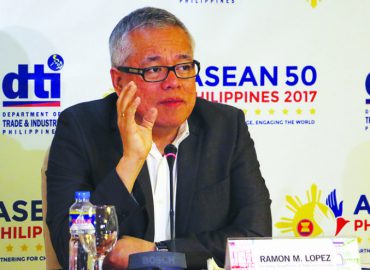By Melissa Luz T. Lopez, March 29 2019; Business World
https://www.bworldonline.com/business-consumer-sentiment-improves/
Image Credit to Business World
INVESTOR and consumer sentiment received a huge lift as the year opened, riding expectations of more business and job opportunities, according to latest results of quarterly surveys which the Bangko Sentral ng Pilipinas (BSP) released on Thursday.
Business confidence recovered in the first quarter to end four consecutive quarters of decline, while Filipino households grew less pessimistic towards prospects for 2019.

“Business confidence is supported by strong domestic demand with brisker business due to election-related spending, increase in orders and consumer purchases, and continued infrastructure and development projects,” Redentor Paolo M. Alegre, Jr., director of the BSP’s Department of Economic Statistics, said in a press briefing at the central bank headquarters yesterday.
Investor sentiment improved to 35.2% in January-March from 27.2% last quarter to mark the highest level since the second quarter of 2018, according to the Business Expectations Survey (BES) results released yesterday.
The central bank said companies were more bullish across the board, riding on expectations for more business activity ahead of the May 13 midterm polls which will trigger increased orders and consumer purchases.
“The election definitely encourages economic activity and also encourages more positive sentiment among business respondents,” BSP Deputy Governor Diwa C. Guinigundo said in the briefing.
Bigger government infrastructure spending also contributed to the rosier outlook, despite delays in enacting the P3.757-trillion national budget. Other factors were perceived enhancements in business strategies, as well as expansion plans and new product lines.
Across businesses, importers were the most upbeat during the quarter as they see more raw materials become available and increased demand for construction equipment, the BSP said. Exporters’ outlook also improved as they see increased orders from abroad, while firms serving the local market said they will likely ride the tide given robust consumer demand and better prices, as inflation sustains its descent.
From a nine-year-high 6.7% in September and October, inflation went down to 3.8% in February to return to the state’s 2-4% goal.
Across sectors, construction firms emerged as the most bullish as they expect more projects rolled out during the dry season. Most other industries reported better prospects for the quarter expect agriculture, fishery and forestry which expect lower production during the lean season.
CONSUMERS LESS PESSIMISTIC
Meanwhile, more households grew positive about their finances during the quarter, but were still outnumbered by pessimists this quarter.
This drove the consumer confidence index to -0.5%, rising from -22.5% in the fourth quarter to log the biggest quarter-on-quarter leap since the Consumer Expectations Survey (CES) started in 2007.
The better-but-still-negative outlook stemmed from anticipated additional or higher income, more jobs, a better peace-and-order situation, and “good governance,” Mr. Alegre said, citing survey responses.
Filipinos from low, middle and high-income groups all said they see improvements in the overall economy, household finances and family income. They also see better conditions for April-June, as well as the year ahead.
More respondents even said that they see the current quarter as a good time to make big-ticket purchases, particularly real property, cars and motorcycles.
The better consumer and investor sentiment is expected to lift overall economic prospects, possibly buoying gross domestic product growth this quarter.
“This suggests that if the expectations of business is rising, 67% of the time, growth may follow in the same direction,” Mr. Alegre said.
Businesses had a more favorable view on the economy, seeing credit conditions still tight but accessible, inflation slower, and the peso stronger. In contrast, consumers expect inflation to keep rising, interest rates to go up and the peso to weaken further.
The BES was conducted Jan. 22-March 19 among 1,496 firms, while the CES covered 5,396 households on Feb. 5-16.

